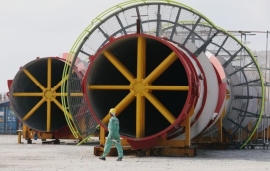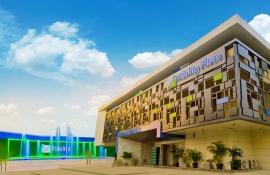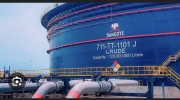
Buhari commissions Dangote refinery
CITIZENS COMPASS – President Muhammadu Buhari and other eminent Nigerians on Monday, May 22, 2023, commissioned the 650,000 barrels per day Dangote refinery located at the Lekki free zone of Lagos State.
The pipeline infrastructure at the refinery is said to be the largest in the world with 1,100 kilometres and will handle 3 billion standard cubic foot of gas per day.
In his welcome address, the Chairman and Chief Executive Ofgicer of Dangote Group of Companies, Aliko Dangote said the first product of the Dangote Refinery “will be in the market before the end of July, beginning of August this year.”
He said, “Beyond today’s ceremony, our first goal is to ramp up production of the various products to ensure that within this year, we’re able to fully satisfy our nation’s demand for higher quality products.”
According to him, the accomplishment is to enable Nigeria to eliminate the tragedy of import dependency and stop — “once and for all” — toxic, substandard petroleum products from being dumped in Nigeria’s market.
The commissioning came with high expectations in the Nigerian energy sector amid plans by the Nigerian government to remove petrol subsidy in the second half of the year. Subsidy payments steadily rose from N351bn in 2005 to N4.39 trillion in 2022, while N3. 6trn was earmarked to fund fuel subsidies for the first six months in 2023.
Dangote said, ” Beyond this, we intend to ensure that our plants are run at the highest capacity of utilisation and the highest efficiency to enable us to export competitively to other markets, especially in the ECOWAS and wider regions in which 53 countries out of 55 are dependent on imports to meet their petroleum products demand,” he added.
The government pins its hopes of ending fuel imports largely on the completion of the Dangote refinery.
In 2021, the federal government gave state oil firm, NNPC Limited, approval to buy a 20 per cent stake valued at $2.76 billion in Dangote Refinery, indicating a significant shift in government attitude.
Built by Africa’s richest man, Aliko Dangote, the massive complex is one of Nigeria’s single largest investments. It has a 435-megawatt power station, deep seaport and fertilizer unit.
The refinery is expected to meet 100 per cent of the Nigerian requirement of all refined products and also have a surplus of each of these products for export. It is designed to process Nigerian crude with the ability to also process other crudes.
The refinery will produce Euro-V quality gasoline and diesel, as well as jet fuel and polypropylene. The management of Dangote refinery says the design complies with the World Bank, US EPA, European emission norms and the Department of Petroleum Resources (DPR) emission/effluent norms.
The refinery is also expected to create a market for the $1 billion per annum Nigerian crude, in addition to foreign exchange earnings of $9.9bn.
The cost of the refinery grew to $19 billion from initial estimates of between $12 billion and $14 billion, after years of delays.
According to a report released by S&P Global Commodity Insights, the Dangote Refinery is anticipating the arrival of its first crude batch in June.
In its recent report titled “Refineries watch Q4 2022” Hawilti, a Pan-African investment research firm, said that the prospect of the new private refinery becoming operational could help redefine the nation’s local refining capacity.
Both the opening of the Dangote refinery and the rehabilitation of state-owned refineries have the potential to make Nigeria Africa’s biggest refining hub by 2025.
“With all state-run refineries undergoing rehabilitation, Nigeria imports all its petroleum products and heavily subsidizes gasoline. It needs the Dangote Refinery to decrease imports, generate currency savings, fight inflation, and ultimately improve its macroeconomic outlook,” it said.
The International Monetary Fund (IMF) projected that the Dangote Refinery would help Nigeria’s economic recovery drive when it starts production.
With crude oil for local refining not subject to the Organisation of Petroleum Exporting Countries (OPEC) quota, the refinery also has the potential to catalyse more domestic crude oil production and boost gross domestic product (GDP),” IMF said.
The Director-general of the Lagos Chamber of Commerce and Industry (LCCI), Chinyere Almona, said the refinery would save and generate foreign exchange, create jobs, positively affect the value of the naira, broaden prosperity for the downstream sector and provide growth opportunities for businesses.
The LCCI views the refinery’s impact on the Nigerian economy as significant. It will also stimulate economic growth by impacting the country’s balance of payments.
“In addition, the Chamber expects the refinery to fuel further growth and development across its value chain, including cosmetics, plastics, textiles etc,” she said.
The President of Dangote Group, Aliko Dangote, in an interview with a special edition of London-based, the Economist Magazine, said with the commencement of operation at the refinery, Nigeria could save up to $10 billion in foreign exchange and generate another $10 billion in exports.
“The refinery’s completion will not only create direct and indirect jobs but will also lead to skills transfer and technology acquisition opportunities that will benefit the downstream sector.
“Moreover, the refinery’s production of critical products like naphtha and polypropylene will stimulate the development of other industries, such as cosmetics, plastics, and textiles.
“Refineries on this scale could save Nigeria up to $10 billion in foreign exchange and generate approximately $10 billion from exports,’’ Mr Dangote said.
–Premium Times







